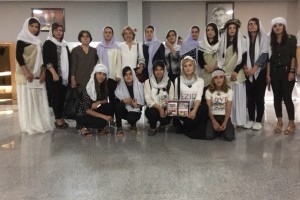
This involves the creation of a safe “living space” intended for victims of ISIS. The goal is to settle Yezidis and Eastern Christian women with orphans victims of the same violence.
More precisely, the action currently underway is to rehabilitate 100 women freed from the hands of ISIS, who would be entrusted with the care of approximately 460 orphans. The project also consists of setting up professional training which could also benefit the inhabitants of the displaced persons camp near Duhok.
This should allow women and children to rehabilitate and rebuild themselves within the framework of a “family” type home. In addition, this will allow women to learn or perfect theoretical and/or practical knowledge so that they can become the main actors in their own lives, and drive progress in their communities.
In the longer term and with the support of the authorities, the objective is to demonstrate the effectiveness of this action so that it can on the one hand serve as an example for the implementation of similar actions and on the other hand, create optimal conditions for returning to their ancestral land where they can contribute to the reconstruction of the social fabric and understanding with other communities in the region.
This project is clearly innovative in supporting the displaced populations of Kurdistan.
The study of needs and feasibility was carried out in consultation with local associations and the services of the Kurdistan Regional Government (KRG) in charge of refugee and displaced affairs but also through camp visits and interviews carried out. with the women concerned. This made it possible to better define the real needs and the conditions necessary for the implementation of this project.
During two years of waiting and inactivity in the camps, women took an important place in the life of the community. International public opinion is aware and defends their cause. The women themselves showed courage and denounced barbarity, which is particularly difficult in their culture and in a patriarchal and inward-looking society.
A partnership protocol was signed between AFAM and the Ministry of Social Affairs of the Kurdistan Regional Government (KRG) with the aim of creating a “living place” to accommodate 100 women and four hundred and sixty orphans, and the General Directorate Yezidis Affairs within the Regional Government allocated 5,000 m2 of land for this action. The Ministry of Social Affairs and Religion and the Ministry of Martyrs are committed to providing the necessary support to facilitate the realization of our project.
Potentially beneficiary women were consulted in order to choose training and workshop creation actions. Individual assessments and training plans are being developed with the help of partner associations.
The theoretical part of the professional training will begin within the framework of the APP workshops. This part will be implemented by the DemDem Association established in Iraqi Kurdistan, in Erbil and Duhok. Psychological and intercommunity support with the creation of exchanges between the different groups is also planned.
Regarding the construction of the living space, the overall plan has been defined, and the specifics of the living space and the technical plans are being finished.
Negotiations are underway with the Œuvre d’Orient and the company LOGELIS, a specialist in new prefabricated systems, which has carried out a study and will make us a proposal.
LOGELIS is the company chosen by the Œuvre d’Orient which finances the Behreke camp: construction of 1000 housing units to accommodate Eastern Christians. These homes will be prefabricated with composite panels (cement-wood walls, polyurethane injected under former) which are waterproof, insulating and transportable. The panel production unit, financed by the Work of Orient, is being installed in Erbil. A church has already been built and the first phase of housing (Ste Irénée) provides for 69 housing units. Representatives of LAFAM and the Œuvre d’Orient have planned a partnership agreement.
At the current stage, it is difficult to establish a precise schedule and budget, but here is a possible approach:
Start-up of the “adult training” activity with a minimum budget, organization of the site, if resources allow, construction of a permanent training center. This center would consist of personalized educational workshops (APP) and will be organized in collaboration with partner organizations and sometimes on their premises. These training courses are planned independently of the construction of the housing.
A canteen/restaurant kitchen is also planned and could be combined with training.
Depending on the progress of the environment planned by the Authorities in the master plan, the center could also house a temporary nursery to allow women to concentrate on their training.
When resources are assured, progressive construction of housing.
The construction of other structures is also possible depending on the needs observed on site, for example a school and/or a dispensary, even temporary.
The action is also intended to be long-term by organizing support for the creation of economic activities as an extension of the training received.